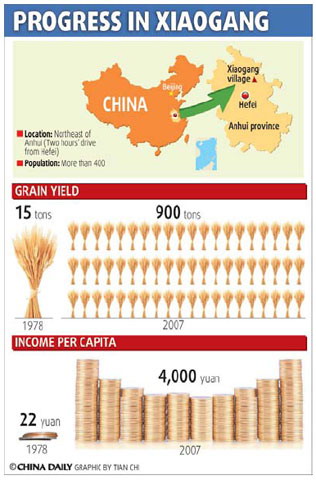
|
CHINA> Focus
 |
|
Message from the cradle of reform
By Fu Jing (China Daily)
Updated: 2008-10-09 07:38 Zhu Gang and his wife get up early. After helping get in the family's crops from the autumn harvest, the 29-year-old is ready to return to a home appliance assembly line in Suzhou, China's "Garden City" close to the east coast. After packing a few clothes into Zhu's traveling bag, the couple ride their motorcycle out of Xiaogang village in Anhui province to catch a long distance bus. Reluctant to part again with her husband, his wife's eyes well up with tears as she watches him pose for a photograph in front of a poster of Deng Xiaoping, the late leader who started China's economic reform. She had been holding back her tears for the past few days because she knows the next time when she would see him again would be around the Chinese lunar new year in late January.
The poster is of Zhu's own choosing, for he has picked up quite a few urban habits of posing against large billboards and posters. But true to her rural background, the wife remains camera-shy. "This coming-and-going has long been part of our life," says Zhu, who first left home for work when he was just 16. His first destination was the southern Chinese city of Shenzhen, the country's largest "special economic zone" that borders Hong Kong. Then he shifted to Shanghai, China's business hub and the best place for someone to get a job - a shift from the economic center of the Pearl River Delta to the Yangtze River Delta. The "life" Zhu refers to is true of about 200 million other rural households. For almost three decades now, members of such rural families have been living a life interspaced by short, happy reunions and long, and at times painful, separation. The scene played out by Zhu just before he left his home in the Fengyang county village has become common in almost every Chinese village - with parents waving to their sons and daughters, wives kissing their husbands goodbye, and wives leaving behind husbands. Workers like Zhu have been the driving force behind China's rapid industrial growth. They send money back to their families and relatives, helping the rural economy to grow, too. In more recent years, with the gradual relaxation in the urban residential rules (which earlier was biased against rural people), some workers have stopped moving between villages and cities, for they have moved their families to urban settlements where they hold permanent jobs or business interests. But few people outside China know the entire process started from Zhu's village of Xiaogang.  Back in 1978, Xiaogang was a poor village, struggling to recover from the long periods of chaotic political campaigns and rigid collective farming. Many children went to bed hungry, and as many as 80 percent of the villagers had resorted to begging in some other places at least once. The change came after a group meeting, called by Yan Hongchang and attended by 18 families in the village decided to divide the collective commune's land and hand it over individuals. Such practice used to be seen as promotion of capitalism, a label for the politically incorrect, and hence it was banned. So to seek a minimum level of self-protection, the 18 families signed a secret agreement to share the loss and gains from the land in future. |
主站蜘蛛池模板: 高要市| 襄汾县| 乐山市| 安阳市| 青铜峡市| 鱼台县| 张北县| 弋阳县| 昭通市| 广平县| 肥东县| 通城县| 长顺县| 夏河县| 类乌齐县| 龙陵县| 安庆市| 潞城市| 松桃| 定日县| 隆德县| 彰化县| 文化| 乌海市| 平顺县| 佛坪县| 靖西县| 绵阳市| 信宜市| 宜都市| 尉氏县| 将乐县| 丰县| 安平县| 顺义区| 东乡族自治县| 西青区| 从化市| 玉树县| 囊谦县| 汝南县|